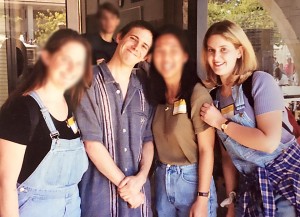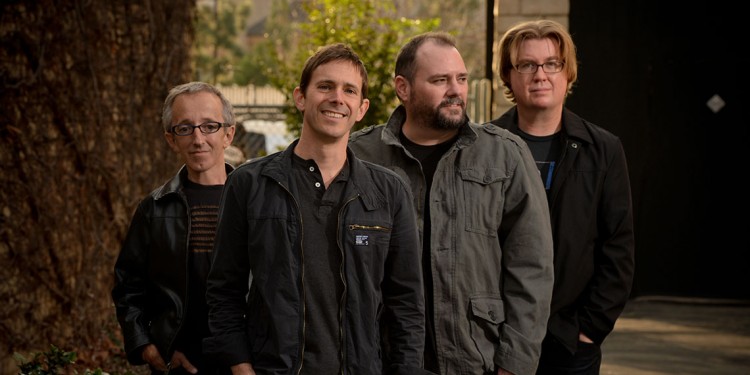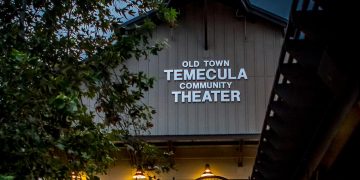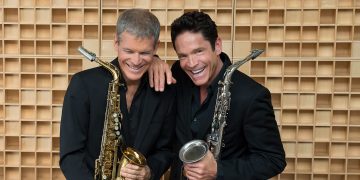Toad the Wet Sprocket: New Album, New Tour, New Constellation
The four members of the Santa Barbara-based alternative band, Toad the Wet Sprocket, were the anti-heroes of the nineties music era; self-described outcasts in an industry filled with shaggy-haired, flannel-wearing grunge rockers rebelling against the bubble gum pop and glittered hair bands of the 1980’s. Toad wasn’t looking to buck the system and Toad wasn’t too cool for school. They were just those other guys, the ones you ignored in high school and still can’t recall when looking in your old yearbook. They were the nobodies who started a band and millions and millions of people took notice.
“Our core fans are there because they are touched by our music,” Toad the Wet Sprocket lead vocalist, Glen Phillips, said during a recent phone interview. “We were not part of some kind of cool, edgier societal movement and, I think, by speaking openly about our vulnerability and alienation, we were able to reach some of the people who didn’t feel they fit in elsewhere. We were geeks and, at that time, we were four geeks who ran the world.”
Toad the Wet Sprocket changed the landscape of alternative music during the 1990’s with what some might say was a softer, more sensitive approach to the popular genre. With chart-topping singles like “Walk on the Ocean,” and “All I Want,” Toad’s third and breakthrough album, “Fear,” released in 1991, catapulted four high school friends into the spotlight; a place where Phillips was never prepared to be and that transition took its toll on his emotional well-being.
“It’s hard to describe depression to people who haven’t experienced it firsthand,” Phillips said. “You can be perfectly aware of reality and you can understand that you’re really lucky to be alive at this time and this place. You can see good things but you can’t grasp them with certain illusions in your own head. You can recognize that they are untrue, these thoughts, but they are still pervasive. They still have the loudest voice and they are real, even though you know they are false.”
 As a UC Santa Barbara alumni, I hold a personal fondness for Toad, as Phillips and his band mates were frequent performers on campus and “Fear,” (along with Dave Matthews’ “Under the Table and Dreaming,” and the soundtrack to “Pulp Fiction”) were the constant musical accompaniment as you walked through the halls of dorms and sorority houses all over Isla Vista. Scoring a photo with Phillips (in my overalls and flannel shirt tied around my waist) was one of the highlights of my college career and, though I did find it odd that he seemed to hide out in the administration office while the rest of the band mingled with sorority girls, there was no outward evidence of the emotional turmoil from which the troubled megastar was silently suffering.
As a UC Santa Barbara alumni, I hold a personal fondness for Toad, as Phillips and his band mates were frequent performers on campus and “Fear,” (along with Dave Matthews’ “Under the Table and Dreaming,” and the soundtrack to “Pulp Fiction”) were the constant musical accompaniment as you walked through the halls of dorms and sorority houses all over Isla Vista. Scoring a photo with Phillips (in my overalls and flannel shirt tied around my waist) was one of the highlights of my college career and, though I did find it odd that he seemed to hide out in the administration office while the rest of the band mingled with sorority girls, there was no outward evidence of the emotional turmoil from which the troubled megastar was silently suffering.
Toad’s break up in 1998 was the catalyst for some of the worst years of Phillips’ life. He is now a well-respected artist and celebrated songwriter with a successful solo career but, in the late nineties, the notoriously fickle industry that had once welcomed Phillips with open arms was now slamming doors in his face. Phillips is now very open with the media about his struggles with depression and, looking back on that time, he recognizes that his condition made it not only that much harder to recover from the constant rejection, but also clouded his ability to appreciate the success while he had it.
“I wish I would have been more grateful. I wish I would have enjoyed myself a lot more and spent a lot less time feeling guilty,” he said. “When [Toad was] together, I basically spent a lot of time feeling like this was supposed to be happening to somebody else and I would get caught at any moment. I think that’s why I got so depressed when the band broke up. I couldn’t get a record deal and I was thinking ‘See? I got caught! I knew it!’ I’ve spent the last fifteen years, or really since Toad broke up, struggling against the industry falling apart and my depression and taking it personally. So it’s been a lot of stops and starts.”
With the help of the six steps outlined in the book, “The Depression Cure,” Phillips has battled back.
“I see a lot of people my age, whose kids are getting older, wondering if happiness is a practice or if being happy is about getting what you want. I’m discovering that it’s a practice,” he said. “It would have been nice to have been happy all along, but I wouldn’t be the person I am without my experiences and what I’ve learned from them.”
Though he does consider his depression a chronic condition, Phillips has conquered many demons personally, as well as professionally, and he seems to have won. As a solo artist, Phillips continues to release studio and independent albums and collaborates with some of the biggest names in the business. In 2010, the opportunity presented itself for Toad the Wet Sprocket to reunite and rerecord some of their biggest hits, upon reclaiming their licensing. Phillips knew he was secure enough in himself and his work to revisit a time in his life where he was propelled between the limelight and the dark.
“I liked getting back to Toad and enjoying it for its own sake, but not having it be the thing that I did; the only thing that I did,” he said. “I can address the music of Toad as a choice of sound and play those songs in a different way than I could when I was a kid, when it was automatic and I was playing as only Toad. It’s amazing to think that I had only the one creative outlet and, at this point in my life, I kind of want as many as possible.”
Phillips wasn’t surprised by the positive experience of returning to the studio with his old friends Dean Dinning, Todd Nichols and Randy Guss, but the members themselves had drifted apart and what he anticipated was much like one would expect of a high school reunion. Phillips never would have predicted what happened next.
On October 15, 2013, Toad the Wet Sprocket released their first studio album in fifteen years, on their own label, Abe Records, as a result of a Kickstarter campaign to which fans contributed in droves. It was obvious the planet wasn’t finished with Toad and, in turn, Toad gave them “New Constellation.”
“Being able to do another album was an amazing feat for us and we created something we are really proud of, but things have changed since we had the mighty marketing behind us,” Phillips said. “We aren’t in the top tier anymore but we knew there were people who still cared about us. The industry is a huge place and it’s very crowded and Kickstarter enabled us to reach out to people who really care about what we do, and there’s a lot of them. We get to sidestep a music industry that doesn’t want to have anything to do with us anyway and we’re okay with that.”
Currently touring with Smash Mouth and Tonic, I asked Phillips if putting himself on a bill with two other bands completely associated with the nineties could possibly date the new Toad, as opposed to branding themselves as a phoenix rising from the ashes with a new album in hand.
“The band is dated,” he said. “There was that big break and, had we continued making records that whole time, maybe things would be different. But we didn’t and I have to respect that the old records were some time ago and they meant something to people at that time in their life. I’m kind of anti-nostalgic, but I understand what that means to people. I have other projects that are about now and about moving forward so I’m okay with it. I’m not looking to take over the world but I am looking to accomplish things that I couldn’t back then, when I was sort of in survival mode, and it’s an exciting time.”
Despite the years of severe depression handicapping Phillips’ ability to be truly content, he was always able to take refuge in the stage and in the support of his fans and even during the worst of it, he never stopped making music.
“For me, when I’m on stage and it’s at its best, I’m not wanting for anything and I’m not pushing anything away. I kind of become the song while I’m singing it,” Phillips said. “If I can feed off the crowd’s energy and be totally present, then that’s my favorite thing. I get to disappear, but also I get to share something that I’ve worked so hard to become good at and I’m doing good work and [the fans] seem to be taking to it. And that’s just the best feeling.”
Phillips finds solace in sharing his work and, just as the iconic Coca-Cola ad once taught us, he speculates as to whether teaching the world to sing is the key to making it a better place.
“I think we’re supposed to sing together,” Phillips said. “Every society, up until this modern, expansive consumerist society, we used to sing together. People who go to church still do that and you will sing when you’re in a crowd and having a mutual experience, but it’s kind of incidental to watching the thing on the stage. We don’t have a lot of opportunities to make music together and I think it’s what we need.”
Perfect harmony, indeed.








No Comments